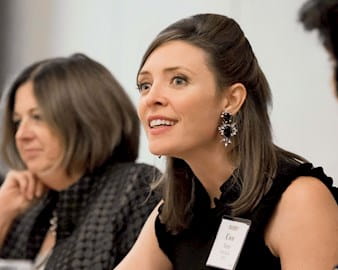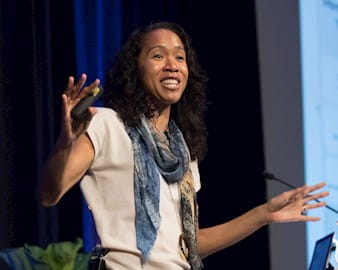
The 2017 Booth Women Connect Conference brought out bold ideas and practical insights from inspiring women professionals.
- By
- January 10, 2018
- Booth Women

A successful woman walking into a boardroom full of men. A junior employee seeing a male colleague get credit for her ideas. A new hire anxiously negotiating her salary offer that is distinctly below market value. Sadly, these types of situations are not yet scenes from a bygone era.
Too often, women in business must walk a tightrope where assertive is characterized as “shrill” and leadership is denigrated to “bossy.” To address these issues, and continue to tackle the larger problem of gender inequality in business, it takes a community. Booth Women Connect Conference began in 2010 as an initiative to build that collaborative network, and to attract more women applicants to Booth. It has evolved into a can’t-miss annual event that brings together nearly four dozen accomplished speakers with alumnae, students, and Chicago business leaders for a day of collaboration, learning, and growth.
“We’re all about helping women bring their personal best to the stage,” said Stacey Kole, PhD ’92 (Economics), deputy dean for alumni, corporate relations, and the Full-Time MBA Program and clinical professor of economics. “When you bring your best, you’re going to be more successful.”
Though Sallie Krawcheck’s name is synonymous with business success, it hasn’t always felt that way for the cofounder of New York–based Ellevest, a digital investment platform for women.
There have been plenty of failures in her life, admitted Krawcheck, a former investment banker who went on to run Merrill Lynch Wealth Management, Citi Global Wealth Management, and Sanford C. Bernstein & Company. “Success and failure are merely steps in the road—you cannot have success without failure,” Krawcheck told the audience during her keynote address.
Instead of shutting out your failures, she suggested, acknowledge them and then find a way to push forward. Among her other pieces of advice: take risks, keep acquiring new skills, and build a network of other women who can help you grow. “We are all supporting each other and beginning to recognize that the days when there is only one seat at the table for us are over,” Krawcheck said. ✦
“I’m really interested in personal growth and being able to develop my soft skills, so I’m excited to attend the workshops today.”
— Jessica Lai, Full-Time MBA Student
In stressful situations, our brains can be our enemy. Research into the inner workings of our gray matter reveals an unfortunate truth: humans have a natural tendency to choke under pressure. But don’t despair. There are ways to succeed even when you’ve bombed in the past, according to cognitive scientist Sian L. Beilock, president of Barnard College in New York. In her keynote address, Beilock revealed three science-backed strategies that can help you thrive when the pressure is on:
Walk away. If you’ve ever had a eureka moment while standing in the shower or cruising down the freeway, you can thank what scientists call the “incubation effect.” It involves the brain subconsciously working out a problem when you take a step back. Instead of banging your head against the wall, escape from the office and take a walk.
Write it down. Journaling about stress has a calming effect on the brain, according to research that Beilock shared about high-school students preparing to take placement tests. “Getting your thoughts down on paper helps remove them from the mind.”
Pull it back. In a high-stakes situation, people have a tendency to hyperfocus, or overanalyze every last detail. This actually harms our performance. Instead, think about three big-picture outcomes that you want to achieve, and then avoid cramming beforehand. “When you do something to take your mind off what is going on, you are less likely to dwell on the details and more likely to succeed.” ✦
“I am a huge fan of Sian. It was really fun to hear her make the connection between creativity and the way your brain works—taking some of the lessons from neuropsychology and applying them to your actual life, coming up with new ideas, and getting rid of a block.”
— Katy Osborn, AM ’11

You don’t have to be a founder to benefit from a startup mind-set. And in an era when the average college graduate will have eight careers, knowing how to innovate and roll with life’s punches is crucial, said Donna Zarcone, ’87, president and CEO of the Economic Club of Chicago.
Zarcone joined two fellow alumnae panelists at a session sponsored by the University of Chicago Polsky Center for Entrepreneurship and Innovation. “It’s going to be more important, no matter whether you’re at an accounting firm or a law firm, to be thinking very entrepreneurially,” Zarcone said, “not only about collecting skills and accomplishments, but about next steps.” Here’s how to unleash your best you:
Don’t take “no” for a final answer. When you’re talking to a new contact for the first time, the goal isn’t to get to “yes,” it’s to get to a second discussion, said angel investor Nancy Hayes, ’80. “I often tell women entrepreneurs who are looking for funding that they’re going to hear ‘no’ a lot, and it generally means ‘not yet.’” Keep at it, she said. Refine your messaging until they’re leaning forward in their seats.
Tailor your story to your audience. PrettyQuick founder and CEO Coco Meers, ’14, initially had trouble attracting an engineer to work for her Chicago-based beauty-booking startup. She quickly learned that many potential candidates couldn’t have cared less about manicures, but the concept of a marketplace that solves for a time-based, constantly shifting inventory sparked their technology interests. She reframed her pitch and landed the talent she needed. “Once I learned to tell my story differently, everything clicked,” Meers said.
Get lean. Take a page from an entrepreneur’s playbook and try out an MVP—or minimum viable product—mentality. Launch a project, learn from it, and then iterate, rather than waiting until everything is perfect. “I think being resource constrained often inspires the creativity that big companies desperately need,” Meers said. ✦

We’ve all been stuck there: the meeting full of yeses that quickly careens out of control because no one puts the brakes on an unproductive train of thought. It’s nearly as bad as the meeting that never gets off the ground amid a flurry of nos.
In an interactive session, adjunct associate professor of behavioral science Heather M. Caruso and The Second City’s Anne Libera suggested a third way: use the phrase “Thank you, because . . .” In other words, acknowledge something of value within someone’s idea or perspective, even if you don’t agree.
Caruso is executive director of Booth’s Center for Decision Research, which has partnered with Chicago’s legendary Second City comedy theater to create the Second Science Project. The SSP intersects behavioral science with improvisational practice to cultivate the behavioral insights and interpersonal skills needed in today’s workplace.
The new evidence-driven collaboration seeks to help people not only understand, but practice adapting their own behavior to accommodate how people improvise their everyday responses to the world.
During their presentation, Caruso and Libera had conference attendees buzzing with excited chatter as the pair led a series of exercises illustrating their points. Attendees shared ideas in small groups, improvising conversations around a theme as a way to test out these communication techniques for themselves.
The “thank you” in “Thank you, because . . .” is crucial, Caruso said. A growing body of research suggests that niceties can lead to better collaboration and more prosocial behavior. Simple gratitude can open up lines of communication, and we feel more valued and trusted when someone thanks us.
The “because” is just as important. Saying “because” gets people thinking about the “why” and encourages people to really listen to each other in order to respond appropriately. It also makes it less likely that someone will interpret your criticism as a personal insult, Caruso and Libera said. ✦
“There are so many amazing women on stage telling us about their experiences, and we’re able to feel validated and inspired. I went to one of the workshops and we were all able to walk away with some tangible next steps in order to build confidence and really be leaders in our workplaces, our families, and our communities.”
— Veronica Herrero, ’06
With boards playing a bigger role in strategic leadership decisions at many nonprofits, there are now more opportunities to serve on a board in a way that helps to push your career forward. It’s OK to start small, perhaps even as a program volunteer, said panelist Susan Kelly, ’96, the director of the Minneapolis-based Art of Youth Foundation.
Kelly started volunteering with Big Brothers Big Sisters of the Greater Twin Cities, and stepped up to a finance role on its board years later. “You may want a broader experience, and you’ll get there, but it’s OK to start elsewhere,” Kelly said.
When you do decide to join a board, said panelist Maria Constantinides, ’83, finding the right fit is crucial. Constantinides, who launched her own nonprofit consulting firm, recommended developing your own niche, guided by your personal passions and interests. “Board service is about giving back, but you have to have the motivation internally,” she told attendees. ✦
“I’m heading to the influencer breakout session. It’ll be great to see women who have been there before, telling you what their experience was and how they got there.”
— Nikhita Giridhar, Full-Time MBA Student
Climbing the corporate ladder as a woman can be a tricky balancing act. Assertiveness can be mistaken for the b-word—“bossy.” Not being assertive enough can backfire too. At a session sponsored by Booth’s Harry L. Davis Center for Leadership, Ohio State University professor Tanya Menon offered a few strategies for owning the spotlight at work:
Forget balance. Crafting a solution that meets every single person’s needs is impossible, Menon said. Instead, move forward with your priorities at heart. We hear “all of these strategies to get the balance right, but balance is actually impossible for us to execute,” she explained.
Be your biggest fan. “Women are more likely to have ‘reflective’ self-esteem, [in which] our sense of self doesn’t reside within us,” she explained. Understanding this tendency can make it easier to stand up for yourself at the office, she added.
Own your successes. At times, Menon noted, women may be too reluctant to claim credit after successfully completing a project or earning a promotion. “We have to get comfortable with women succeeding without apologizing for it in this way,” she said. ✦
If you could write a letter of advice and inspiration to the “you” you were 15 years ago, what would it say? In a session entitled “Letters to My Younger Self,” three alumnae—Suzanne El-Moursi, ’12 (XP-81), president of Chicago-based Uplift Data Partners; Shaelyn Otikor, ’12, vice president and relationship manager of global fund services at Northern Trust in Chicago; and Jessica Tien, ’91, principal economist at global law firm DLA Piper—explored the wisdom and experience they would pass along.
They reflected on the emotions their letters evoked, and the people, places, and experiences that inform who they are today.
El-Moursi, who was raised in Egypt, shared that as a recent college graduate, she dug into her work with “high energy and intensity” and said she would counsel her younger self to channel her passion. Otikor said she would tell herself as a young professional to lean on a personal “board of directors” to navigate the workplace and build her soft skills. Tien, who emigrated from Taiwan in order to start graduate school at Booth, encouraged her 18-year-old self to collect experiences and seek out inspiration. ✦
We'd love to hear your Booth memories, stories, connections...everything.